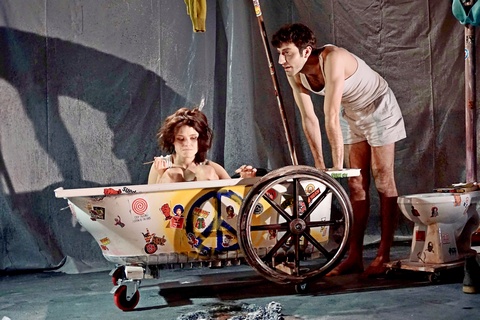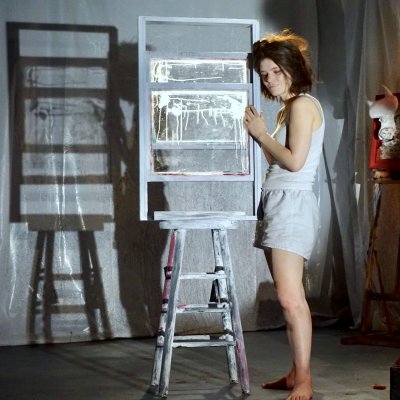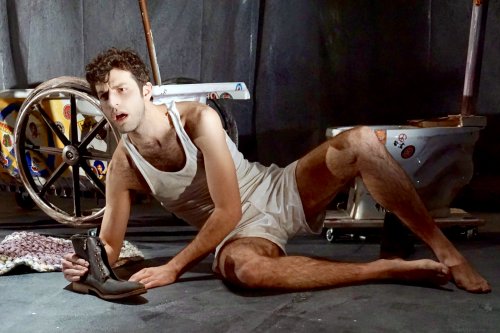The Sickness
A bleak and hopeless look into the lives of two spiraling heroin addicts.

Mia Vallet and Ryan Cupello in a scene from Emil Varda’s “The Sickness” at the Access Theatre (Photo credit: Ewa Kowalska)
[avatar user=”Christopher Caz” size=”96″ align=”left” ] Christopher Caz, Critic[/avatar]
Before The Sickness begins, the audience gets its opportunity to review scenic/costume designer Vincent Gunn’s economical and perfect set: walls of filthy plastic sheeting, a grungy bathtub and seatless toilet, both on wheels and sporting sparse graffiti, a nondescript piece of art on an easel, and errant pieces of clothing strewn across the stage.
The play opens with Y (Ryan Cupello), an ashen shell of a man in underwear, huddled under a floor mat, twitching and shivering, muttering a song about Icarus, as a recorded voice begins speaking:
…Heroin-offers oblivion not ethereality, rush into a void rather than a slow drifting to blissful serenity, no more slow drifting to serenity but-oblivion and visceral rush no ritual, no ceremony just rush oblivion. Paradise has no words.
It’s a good thing one can read this opening here, because the volume of the recording is so low, and the accent of the voice so heavy, that most of the words are lost, and when the Narrator (Mark Lobene, not the voice on the tape), a grim spectre and chorus of one, enters in bizarrely dapper clothing dragging a piece of furniture, the remaining words are obscured as well. Note: since there actually is a Narrator in this play, it would be better if this character delivered this opening paragraph to the audience, and not a recording.
Y is eventually awakened by the entrance of X (Mia Vallet), a manic and disheveled woman who has arrived with more heroin and marijuana in a plastic grocery bag.
Y: I love ganja . . . it’s like rinsing off before jumping in the pool . . .
X undresses and compulsively showers, without turning on the water, ranting about being raped by cops when her dealer was raided:
X: I don’t want to get pregnant…I don’t wanna give birth to an NYPD bastard…
Y: You can’t get pregnant…you didn’t get your period for the last six months, you can’t get pregnant without a period.
X: It will be like Rosemary’s Baby…the evil… the NYPD evil…

Mia Vallet in a scene from Emil Varda’s “The Sickness” at the Access Theatre (Photo credit: Ewa Kowalska)
Y has a penchant for killing roaches and describing them and their deaths in detail; one gets the sense that he and X resemble these roaches. X compulsively cuts her hair as she rants against Y and the rest of the world. Both X and Y take their countless doses of heroin, spewing vomit and words at each other with little purpose other than to get high for the next 80 minutes of this bleak play about these two heroin addicts and their pathetic, deluded existence.
I have to take a moment to admire playwright/director Emil Varda’s clever choice to avoid depicting X and Y their taking heroin intravenously. Instead, they slap a square of paper to their wrists and foreheads before their faces and bodies enter that euphoria they crave. It is a creative alternative to mimicking the triggering act of injecting into their veins.
The lighting design by Alexander Fetchko combined with Gunn’s set and Varda’s clever staging also deserves special mention. Cross-lighting and backlighting from fresnels mounted at different heights and angles, behind and in front of the ugly plastic sheet walls, produce eerie and effective shadows of X and Y, adding to the other-worldliness of their existence. The use of flashlights also creates chilling reliefs of X and Y’s mouths and bodies during wistful flashbacks where they describe earlier, happier, or at least different, times.
The difficult thing about depicting extreme drug usage for an entire length of a play is that after a few minutes the audience gets a pretty clear picture of the doomed, meaningless life of these addicts, invariably asking themselves the question, “OK, so…what next?”
Y: I woke up tonight because somebody was squeezing my hand. I woke up in my dream or maybe I woke up and it was my left hand squeezing the right.
Even before the playwright pays homage to William S. Burrough’s Naked Lunch through this last line, one is already drawing comparisons to the psychotic, structureless existence of that novel, and wondering whether there is anything more to The Sickness than the eventual demise of two wasted lives of X and Y. Later that evening my theater companion admitted to thinking, “die already” at some point during the play, because there seemed to be nothing else happening. The audience is given no reason to like the characters, no reason to think they’re ever going to change and no reason to root for their survival; all that they’re left with is the desire for the play to end.

Ryan Cupello in a scene from Emil Varda’s “The Sickness” at the Access Theatre (Photo credit: Ewa Kowalska)
So, what is left of this play outside its chaotic depiction of heroin addicts? One hopes that amidst the mayhem, at least some thought-provoking lines might give the audience something to chew on. There are some literary bits that are interesting to ponder, like Y’s apocalyptic view of the world:
Y: We live in a terrible time…an era which is new to humans…terrible, horrible time. Where are we going…Where are all the blind social forces drawing us? There is nothing in front of us…just flames.
Some poems and music-less songs go by which require more analysis. Repeated references the lyric “Did you ever go clear” from Leonard Cohen’s “Famous Blue Raincoat” run by. These and other lines which require more thought come and go so quickly that the audience has no time to let their effects and meanings simmer. Perhaps The Sickness would make for a better novel than a play, like Naked Lunch, so its content can be absorbed at a reader’s pace.
The play is set in the early 2000’s; at one point X makes a statement that sounds hauntingly prescient regarding our current political climate of fake news which renders today’s citizens immobilized:
X: “If everybody always lies to you, the consequence is not that you believe the lies, but rather that nobody believes anything any longer… And a people that no longer can believe anything cannot make up its mind. It is deprived not only of its capacity to act but also of its capacity to think and to judge. And with such a people, you can do what you please.”

Mark Lobene in a scene from Emil Varda’s “The Sickness” at the Access Theatre (Photo credit: Ewa Kowalska)
It is ultimately disappointing, though, to realize that this piece of dialogue isn’t even from the playwright’s own pen; it is for all intents and purposes plagiarized from a statement made by German-American philosopher and political theorist Hannah Arendt in a 1974 interview. Sure, it’s quoted in the script but audiences can’t hear quote marks in spoken dialogue, and no one would believe for a minute that a heroin-riddled art major would have ever heard let alone memorized such a long statement, word for word, in order to quote it back in character. At least when Varda sampled from Naked Lunch he gave credit then; in this case there is no footnoting or credit given in the written script to Arendt.
Y: If we don’t kill them, they’ll kill us…simple….us or them…. You know, they, your lovely cockroaches, will survive an atomic explosion? Them, rats, and Trump only… survive atomic explosions…I hate them… hate! Hate! Hate!!!
It seems anachronistic that Trump gets a mention in this play, however appropriate with cockroaches, since the story takes place in the early 2000’s before Trump was ever politically relevant enough to warrant a call out.
Vallet and Cupello play X and Y with intense conviction, giving as much humanity as they’re allowed to by the script (which isn’t much). Vallet’s early exchanges are sometimes buried too deeply in her characterization of X and mumbled too low to be understood, but she eventually opens up and speaks out. Their best moments are when they’re given a chance to speak about their pasts, faces glued to the window, trying to look outside of their existence with flashlights, seeing nothing.
In one of the final exchanges between X and Y the bitter loneliness and isolation that heroin has brought to their lives is voiced:
Y: Come, let’s talk.
X: Talk? There’s nobody to talk with, nobody to talk to.
Y: What do you mean there’s nobody to talk to?
X: There’s nobody here.
Monothematic and bleak as the play is, Varda’s direction is appreciable and effective. As a piece of literature, The Sickness has promise but as a play it is brutal to sit through. When X and Y finally overdose, everyone gets to go home, perhaps a little more grateful for their own good fortune but no less judgmental of drug addicts than they might have been upon arrival. Substance abuse affects millions of people worldwide. If you or someone you know suffers from substance abuse, please contact the Substance Abuse and Mental Health Services Administration (SAMHSA)’s National Helpline – 1-800-662-HELP (4357).
The Sickness (through February 29, 2020)
W.I. Productions
Access Theatre, 380 Broadway, at the corner of White Street, in Manhattan
For tickets visit https://www.thesicknessplay.com/
Running time: 80 minutes without an intermission






Leave a comment